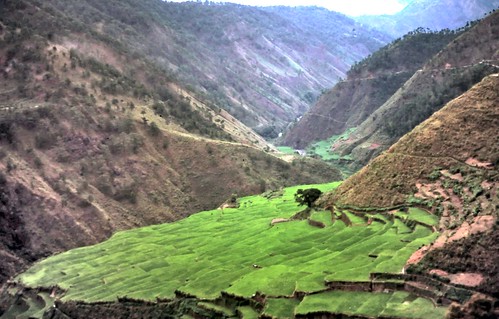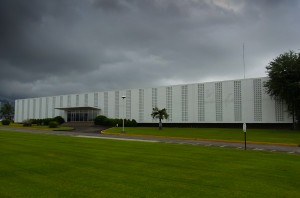Search Results for Tag: Philippines
Rice – staple crop and climate killer?
Our reporter Carl Gierstorfer is currently filming in the Philippines for his upcoming report on sustainable rice production: Here is his third dispatch from the field:
 "There are a lot of challenges ahead to adapt the world's most important crop – rice – to the consequences of climate change. Fortunately scientists got some smart ideas. But you might be surprised that rice farming itself has a negative impact on the world's climate. Not the plant is the problem, but the method in which it is grown. Rice (a sort of grass) needs a lot of water to grow. In fact, farmers flood their fields during the farming season, so that a fair part of the plant is submerged. This has many advantages; it keeps pests at bay, recycles nutrients and so on. But there is a downside. In these oxygen-depleted conditions bacteria grow that emit methane, a powerful greenhouse gas. In rice producing countries, the total emissions of methane make up a significant part of greenhouse gas emissions.
"There are a lot of challenges ahead to adapt the world's most important crop – rice – to the consequences of climate change. Fortunately scientists got some smart ideas. But you might be surprised that rice farming itself has a negative impact on the world's climate. Not the plant is the problem, but the method in which it is grown. Rice (a sort of grass) needs a lot of water to grow. In fact, farmers flood their fields during the farming season, so that a fair part of the plant is submerged. This has many advantages; it keeps pests at bay, recycles nutrients and so on. But there is a downside. In these oxygen-depleted conditions bacteria grow that emit methane, a powerful greenhouse gas. In rice producing countries, the total emissions of methane make up a significant part of greenhouse gas emissions.
Now here is the challenge: feed ever more people with rice, make farming more productive, but reduce emissions of greenhouse gases. Impossible? There is a way to get rid of the gas-emitting bacteria and even save precious water along the way. It is a simple method that scientists now try to bring to the farmers. How exactly this works, you will find out in my report.
We have traveled a fair deal now: from Manila south to the International Rice Research Institute (IRRI), then up north to the granary of the Philippines – the region of Nueva Ecija. We then headed to northern Luzon, to the Sierra Madre mountain range. Here are the famous rice terraces, carved into the hillsides by farmers some 2000 years ago. A UNESCO world heritage site – and topic of my next entry…"
(image thanks to CanadaGood @flickr)
Feeding the world in a changing climate
Here is the second dispatch from our reporter Carl Gierstorfer, presently filming on location in the Philippines:
"Second day shooting at the International Rice Research Institute (IRRI). Anyone talking about world food security cannot ignore IRRI's contribution. Many popular strains of rice, grown on millions of hectares, have been bred here. IRRI was founded half a century ago. But maybe its real challenges lie ahead. Until 2050 another three to four billion people need to be fed. The majority of them on rice. With less resources, an unpredictable climate, and not much more land.
Yet still, scientists here are optimistic: they think they can meet the challenges. Meet Sigrid Heuer, a German molecular biologist. She worked on a team that bred Sub-1, a strain of rice that can survive flash floods, which are expected to become more common due to climate change. Mining IRRI's seed bank, with more than 125,000 varieties, never disappoints the scientists. In the cold archives, there are long forgotten strains; rejected because they were not tasty enough, or had too little yield. But these loners might just have that special trait required in the future – like surviving underwater for two weeks. Or tolerating salty conditions. Scientists like Heuer look for these varieties; they isolate useful traits and breed them into popular strains. Sub-1 is simply Asia's most favorite variety with a gene that allows it to survive heavy floods.
IRRI is a little world in itself. More than 800 people work here; buildings and fields are spread out over a wide area; a settlement with its own fire fighters and strange 1950s architecture. I had a stroll around at night – have a look at the pictures. And, yes, alcohol is forbidden here. Some of IRRI's founders apparently were Quakers…"









Feedback